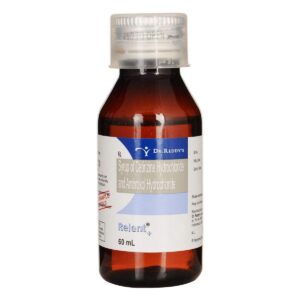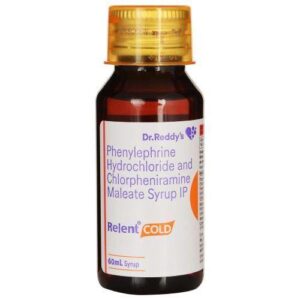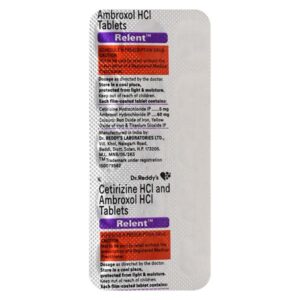AMBROXOL + CETIRIZINE
Ambroxol: Ambroxol is a medication used to treat respiratory conditions such as bronchitis, asthma, and other respiratory tract disorders. It is commonly available in the form of tablets, syrups, and inhalants.
The primary mechanism of action of Ambroxol is its ability to thin mucus secretions in the airways, making it easier for the patient to cough out phlegm. It increases the production of pulmonary surfactant, a substance that helps to keep the air sacs in the lungs open and functioning properly. Ambroxol also has antioxidant properties, which can help reduce inflammation in the airways.
The dosage of Ambroxol can vary depending on the form of the drug and the specific condition being treated. Generally, for adults and children over 12 years of age, the recommended dose is 30 mg three times a day. For children between 6 and 12 years of age, the dose is usually 15 mg three times a day. However, it is important to follow the instructions provided by your healthcare professional.
Some common side effects of Ambroxol may include gastrointestinal disturbances like nausea, vomiting, and stomach pain. Rarely, allergic reactions such as rash, itching, and difficulty breathing may occur. If any severe side effects are experienced, it is important to seek medical attention immediately.
It is worth noting that Ambroxol should be used with caution in patients with a history of gastric ulcers or epilepsy. Additionally, it may interact with certain medications, so it is important to inform your healthcare provider about any other medications you are taking.
The use of Ambroxol should be done under the guidance of a healthcare professional, and it is important to follow the prescribed dose and duration of treatment to achieve optimal results.
Cetirizine: Cetirizine is an antihistamine drug used primarily to treat allergies such as hay fever, hives, and allergic rhinitis. It is available over-the-counter and by prescription in various forms including tablets, chewable tablets, liquid, and oral-dissolving tablets.
The mechanism of action of cetirizine involves blocking the effects of histamine, a substance produced by the body in response to an allergic reaction. Histamine is responsible for causing symptoms such as sneezing, itching, runny nose, and watery eyes. Cetirizine works by binding to histamine receptors in the body, preventing histamine from producing these allergy symptoms.
The recommended dose of cetirizine varies depending on the age and condition being treated. For adults and children above the age of 6, the usual oral dose is 10mg once daily. For children aged 2 to 6, the recommended oral dose is 5mg once daily. It is recommended to follow the specific dosing instructions provided by a healthcare professional or the product label.
Common side effects of cetirizine may include drowsiness, dry mouth, sore throat, headache, and stomach upset. These side effects are generally mild and go away on their own. However, some individuals may experience more severe side effects such as difficulty breathing, abnormal heart rate, or allergic reactions. It is important to seek immediate medical attention if any severe side effects occur.
Cetirizine may interact with other medications, so it is important to inform your healthcare provider about any other drugs you are taking before starting cetirizine. Additionally, cetirizine may cause drowsiness, so caution should be exercised when driving or performing activities that require alertness until you know how the drug affects you.
Overall, cetirizine is a widely used and effective antihistamine drug for the treatment of allergic conditions. However, it is recommended to consult with a healthcare professional before starting any new medication to ensure it is appropriate for your specific condition and medical history.



